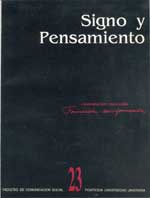Abstract
Las preguntas están. La explicación “moderna” es una ficción creada donde “lo bello”. La razón, lo absoluto y lo trascendente todavía pueden ser demostrados, sentidos, sublimados. Al final, es sólo otra manera de andar perdido en una penumbra y preocupado por una forma que deforma tanta tradición. Ahí, en ese deambular por el sin-sentido de lo postmoderno desde el “sentido” de la modernidad que es el ensayo “Las premisas de Frankenstein” del profesor F. Vásquez, sitúo la reflexión y encuentro nuevas “razones” para explicar por qué la postmodernidad es “sentidamente” una respuesta ante una crisis de sentido de nuestro tiempo. De acuerdo, se ha abusado en “el nombre de la postmodernidad” pero a mí me explica mejor el mundo este “deambular de verdades ficciones” que ese proyecto único de una verdad, un desarrollo, una belleza que es la modernidad. Por ejemplo, vos.. ¿dónde podes vivir mejor la penumbra? … en la academia…. Por eso es fácil aducir “la razón” desde ahí…. Desde donde se otorga “verdad” a lo otro desconocido… es fácil ser 2el otro” que no participa y defender “la moral” de tu dominador…. Quitale filosofía y estética y razón y conocimiento y saber y alma, dejá lo posmoderno como una pauta cultural (Jameson), una estructura del sentimiento(Williams), una dilución de lo solido (Bergman) un neo-barroco (Calabresse), un pensamiento débil(Vattimo), un neo-medialismo (Eco), una hibridación cultural (Canclini) …. O ¿cómo entendés el espíritu de este tiempo, espacio… la forma que ha asumido el today?This journal is registered under a Creative Commons Attribution 4.0 International Public License. Thus, this work may be reproduced, distributed, and publicly shared in digital format, as long as the names of the authors and Pontificia Universidad Javeriana are acknowledged. Others are allowed to quote, adapt, transform, auto-archive, republish, and create based on this material, for any purpose (even commercial ones), provided the authorship is duly acknowledged, a link to the original work is provided, and it is specified if changes have been made. Pontificia Universidad Javeriana does not hold the rights of published works and the authors are solely responsible for the contents of their works; they keep the moral, intellectual, privacy, and publicity rights.
Approving the intervention of the work (review, copy-editing, translation, layout) and the following outreach, are granted through an use license and not through an assignment of rights. This means the journal and Pontificia Universidad Javeriana cannot be held responsible for any ethical malpractice by the authors. As a consequence of the protection granted by the use license, the journal is not required to publish recantations or modify information already published, unless the errata stems from the editorial management process. Publishing contents in this journal does not generate royalties for contributors.


